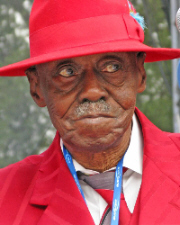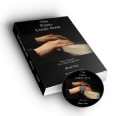Chicago Blues Pianists
Jimmy Yancey, Big Maceo, Roosevelt Sykes, Sunnyland Slim, Champion Jack Dupree, Pinetop Perkins, Memphis Slim, Lafayette Leake, Otis Spann
The style of the Chicago blues pianists is the sound that many people think of when when referring to "blues piano." Chicago has a long history of blues and jazz, dating back to the early 1920's when musicians left New Orleans' Storyville district to find work in the north.
Though many of these pianists performed solo, Chicago is known for the blues bands that played in the city's night clubs. The piano plays a supporting role, as part of the rhythm section, sometimes filling in the "gaps" with tinkling blues riffs in the high register. Most of the left hand patterns are derived from boogie woogie piano.
Here are some of the more influential Chicago blues pianists.
Jimmy Yancey, 1898-1951
Jimmy Yancey was born in Chicago and is considered the "father" of Chicago blues piano. He was born into a musical family. His father played guitar professionally, and took young Jimmy on the road. Soon he was singing in the traveling vaudeville show, becoming famous by 1915.
Jimmy Yancey, famous Chicago blues pianist, also played professional baseball in the Negro League, and had a long-standing job as a groundskeeper for the Chicago White Sox.
He has the distinction of being the first artist to record an album for Atlantic Records, with his wife Estelle, as Jimmy and Mama Yancey.
Jimmy Yancey's style was light, sometimes delicate, and not hard-driving. He played in all keys, but had the peculiar habit of ending everything in E flat. He died in 1951 in Chicago.
Big Maceo, 1905-1953
Major "Big Maceo" Merriweather was born in Atlanta. He taught himself piano, and by the 1920's, had moved to Detroit. He played rent parties and clubs as a solo pianist, singing and playing boogie and blues.
In the 1930's, Big Maceo settled in Chicago. He had his first hit in the early '30's with "Worried Life Blues" on Bluebird Records, beginning a career making more records and touring the south and other northern cities.
Big Maceo's huge voice and powerful piano were a major influence on other Chicago blues pianists.
Roosevelt Sykes, 1906-1983
Roosevelt Sykes was born and raised in Elma, Arkansas, just outside of Helena. He started playing piano at age 15, and was soon playing boogie woogie at the turpentine and lumber camps throughout the south.
He began his recording career in the 1920's, recording under many names. Sykes had a hit with "44 Blues" on Okeh Records in 1929. The song has since become a blues standard. He moved to Chicago in 1935, and began recording for Decca, later switching to Bluebird Records in the early '40's. In the '60's Sykes recorded for Delmark, Storyville and Folkways Records.
Roosevelt Sykes left Chicago in 1954, to settle in New Orleans. He will be remembered for his blues classics including "Honeydripper," "Driving Wheel," and "The Night Time Is The Right Time."
Sunnyland Slim, 1907-1995
Sunnyland Slim was born Albert Luandrew in Vance, Mississippi. He taught himself how to play piano as a teenager, and moved to Memphis when he was 18. He played around Memphis at Beale St. bars, and travelled through the south until 1942 when he moved to Chicago.
He began recording in 1946, and soon was one of the most in-demand of the Chicago blues pianists, playing on sessions with Muddy Waters, Howlin' Wolf, Little Walter and Sonny Boy Williamson.
Sunnyland Slim kept performing the blues right up until his death at age 87.
"Champion" Jack Dupree, 1908-1992
"Champion" Jack Dupree was born in New Orleans, and orphaned at age 2. He was raised at the New Orleans Home for Colored Waifs, along with another famous musician, Louis Armstrong. He taught himself piano as a boy, and later had some informal lessons from Tuts Washington. He was a "spy boy" for the Yellow Pocohantas Tribe of New Orleans Mardis Gras tradition.
In the late 1920's, Jack moved to Indianapolis, Indiana, where he met blues musicians Scrapper Blackwell and Leroy Carr. He landed in Detroit, and took up boxing, with the help of Joe Louis. He boxed 107 bouts, and won the Golden Gloves, earning the name "Champion."
In 1930, Jack left Detroit and boxing behind, and moved to Chicago, to play blues piano. He worked with Big Bill Broonzy extensively, and many other Chicago blues musicians.
Jack moved to Europe in the early 1970's, where he was treated like a pop star. He lived briefly in Nova Scotia in the '80's, moved back to Europe and died in Germany in 1992.
Pinetop Perkins, 1913-2011

Pinetop Perkins was born Joe Willie Perkins in Belzoni, Mississippi. Joe started on guitar, but later switched to piano. He got the name "Pinetop" because he loved to play "Pinetop's Boogie Woogie," by Pinetop Smith and one of the first big boogie woogie piano hits.
In the 1930's, Pinetop Perkins played on Sonny Boy Wiiliamson's radio show King Biscuit Flower Hour. He moved to Chicago in the 1950's and played with Earl Hooker. In the late '50's, Pinetop dropped out of the music business. In 1968, Earl Hooker pulled Pinetop out of retirement to tour and record. When Otis Spann, one of the most famous of the Chicago blues pianists, left the Muddy Waters Band, Pinetop took over the piano chair. He stayed with Muddy until 1979, when he left to start The Legendary Blues Band.
Pinetop Perkins won a Grammy in 2008 for "Best Traditional Blues Album" for his CD The Last Of The Great Delta Bluesmen. Perkins is the oldest Grammy winner, having also won in 2011. Perkins died just two months after receiving his Grammy at the age of 97.
Memphis Slim, 1915-1988
Memphis Slim was born John Chatman in Memphis, Tennessee. John grew up around music and started playing piano before he was 10. His father, Peter, sang and played piano, and also owned and operated juke joints in Memphis. When John first recorded for Okeh Records in 1940, he published his songs and copyrights under his father's name; as "Peter Chatman," to honor his father.
Before that first recording in Chicago, John spent the 1930's playing honky tonks in Memphis, Arkansas and Missouri. In 1937 he found his way to Chicago, and teamed up with Big Bill Broonzy, playing the South Side blues clubs. In 1940, he did some recording session work for Bluebird Records, and the producer came up with the name "Memphis Slim."
Later in the '40's, Memphis Slim assembled a jump blues band with horns, and some of the members included Arthur Big Boy Crudup, Big Bill Broonzy and Lonnie Johnson.
In 1962, Memphis Slim moved to Paris, and toured Europe frequently.
Chicago blues pianist Memphis Slim recorded over 500 songs in his lifetime, including the blues standard "Everyday I Have The Blues," attributed to his father Peter Chatman. He received the Order Of Arts and Letters from France and was named Goodwill Ambassador-At-Large by the United States Senate.
Lafayette Leake, 1919-1990
Lafayette Leake was Born in Winona, Missouri, where he taught himself to play piano. By the 1950's he was one of the most in-demand of the Chicago blues pianists. He appeared on many Chess Records sessions with artists including Sonny Boy Williamson, Otis Rush, Little Walter, Buddy Guy and Willie Dixon. He is the pianist on Chuck Berry's "Johnny B. Goode."
In the 1960's he performed as a member of The Chicago Blues All-Stars, which continued touring until the mid '70's. He also appeared on "Love That Woman" recorded by Peter Green's Fleetwood Mac.
In 1990, he fell into a diabetic coma, and was undiscovered for several days before being taken to a hospital, where he later died.
Otis Spann, 1930-1970
Otis Spann was born and raised in Jackson, Mississippi, in a musical household. His father played piano, and his mother played guitar. Otis started on the piano at age 8, and was playing in bands by the time he was 14.
He moved to Chicago, on his own at age 16, and met up with Big Maceo, his idol, who took Otis under his wing. Big Maceo got Otis a gig at the famous Tic Toc Lounge. In 1952, Otis began working with Muddy Waters, a gig that would make him the most famous of the Chicago blues pianists. This was his full-time gig ubtil 1969, though he did plenty of session work for Chess Records playing on other artist's songs, and also occasionally recording as a leader. In 1954 he had a blues hit with "It Must Have Been The Devil," which featured B.B. King on guitar.
In the early 1960's, he recorded an album for Decca Records U.K., with Muddy Waters and featuring then Yardbirds guitarist Eric Clapton. In 1966 he recorded for Bluesway, and made an album in 1969 with members of Fleetwood Mac, called The Biggest Thing Since Collossus. He died in Chicago from liver cancer.
PineTop Perkins photo: Cathy, Creative Commons Lic.
Start Playing Piano Today with the Piano Guide Quick Start Course!
Easy to follow step-by-step lessons designed for adult beginners. The next best thing to private lessons!
What You'll Learn:
- Notes on the piano/keyboard
- Proper fingering
- C major scale
- Chords
- How to read music
- And much more!

Video lessons - watch as I play everything for you.

